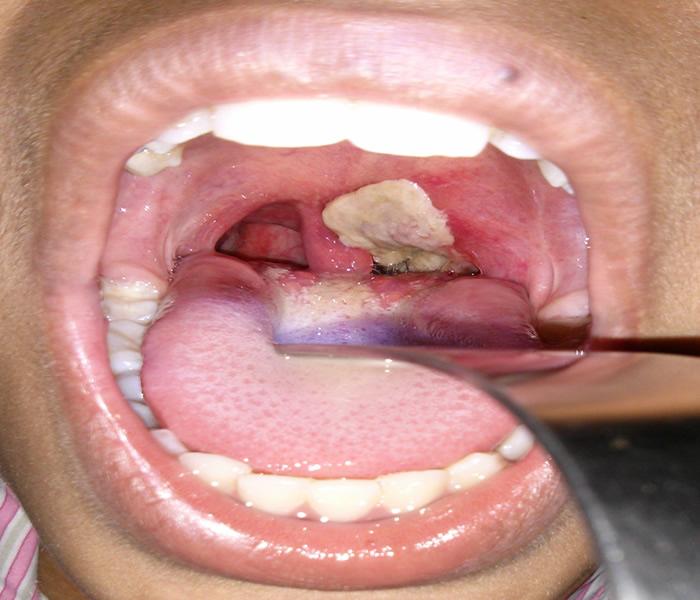Health
10 Things To Know About Deadly Diphtheria Disease
Published
2 years agoon
By
Editor
… NCDC Rolls Out Toll-free Number
The Nigeria Centre for Disease Control and Prevention has confirmed cases of diphtheria in Kano and Lagos states.
This is even as the centre said it was monitoring the situation in Yobe and Osun states where cases were being picked up.
Here are the 10 things you need to know about diphtheria disease:
1. Diphtheria is a serious bacterial infection caused by the bacterium called Corynebacterium species that affects the nose, throat, and sometimes, skin of an individual.
2. Diphtheria spreads easily between people through direct contact with infected people droplets from coughing or sneezing, and contact with contaminated clothing and objects.
3 . People most at risk include children and adults who have not received any dose of the pentavalent vaccine, people who live in areas with poor sanitation, people who live in a crowded environment, and healthcare workers exposed to suspected or confirmed cases of the disease.
4. The onset of signs of the disease usually starts after two to 10 days of exposure to the bacteria.
5. Symptoms of diphtheria include fever, runny nose, sore throat, cough, red eyes (conjunctivitis), and neck swelling. In severe cases, a thick grey or white patch appears on the tonsils and/or at the back of the throat associated with difficulty breathing.
6. Complications from diphtheria include airway blockage, damage to the heart muscle, nerve damage, and kidney failure. However, for some people, respiratory diphtheria can lead to death.
READ ALSO: NCDC Confirms 123 Diphtheria Cases, 38 Death
7. To prevent it, the Nigeria childhood immunisation schedule recommends three doses of pentavalent vaccine (diphtheria toxoid-containing vaccine) for children in the sixth, 10th, and 14th week of life.
8. Diphtheria treatment involves using diphtheria antitoxin to stop the bacteria toxin from damaging the body and using antibiotics to kill and get rid of the bacteria. The treatment usually lasts for two to three weeks.
9. Poor immunisation coverage can lead to a resurgence of the disease. Therefore, parents must ensure that their children are fully vaccinated against diphtheria with three doses of the pentavalent vaccine as recommended in in the childhood immunisation schedule.
10. Individuals with signs and symptoms suggestive of diphtheria should isolate themselves and notify the Local Government Area authorities, state disease surveillance officer, or the NCDC through our toll-free line (6232).
PUNCH
You may like


NCDC Records 1,307 Cholera Cases, 34 Deaths In 30 States


FG Tracks 1,277 Persons As Lassa Fever Kills 122


Over 1,300 Diphtheria Deaths Recorded As Vaccination Gaps Persist – NCDC


Diphtheria Spreads To 18 States As FG Confirms 7,202 Cases, 453 Deaths


Africa Records 26,000 Cholera Cases, 660 Deaths In January – WHO


NCDC Confirms 123 Diphtheria Cases, 38 Death
Health
LASG FLags Off Polio Outbreak Response Campaign
Published
6 months agoon
January 20, 2025By
Editor
The Lagos State Government, through the Lagos State Primary Health Care Board, has launched the 2025 Polio Outbreak Response Campaign, reaffirming its commitment to eradicating polio and safeguarding the health of its children.
The ceremony, held at the Simpson Primary Healthcare Centre, was led by the First Lady of Lagos State, Dr. (Mrs.) Claudiana Ibijoke Sanwo-Olu, represented by Mrs. Widad Jumoke Mustafa, a member of the Committee of Wives of Lagos State Officials (COWLSO).
In her address, the First Lady emphasised the state government’s proactive measures to keep Lagos polio-free, highlighting the critical importance of the campaign in preventing the debilitating effects of poliomyelitis, which can result in paralysis or death.
READ ALSO: IMPEACHMENT: Lagos Ex-Speaker, Obasa’s ‘Sins’ Revealed
The First Lady also called on parents, community leaders, and stakeholders to support the campaign by ensuring eligible children are vaccinated.
Targeting children aged 0-59 months, vaccination teams will administer the Oral Polio Vaccine (OPV) to prevent virus transmission.
Dr. Kemi Ogunyemi, the Special Adviser on Health, expressed gratitude to Lagosians for their continued cooperation in the fight against polio. While appreciating all healthcare workers and partners for their services, Mrs. Ogunyemi encouraged parents to present their children and wards for the exercise.
Also speaking, the Chairman of Lagos Mainland Local Government, Mrs. Omolola Rashidat Essien opined that Immunization is key in ensuring that children are kept safe from polio and other vaccine preventable diseases.
Dr. Abimbola Bowale, the Supervising Permanent Secretary, Lagos State Primary Health Care Board, who also spoke at the event, underscored the life-saving importance of immunization.
“All children aged 0-59 months need multiple doses of the polio vaccine to ensure full protection. Any child missed represents a potential risk for the poliovirus to spread. The vaccine is safe, effective, and crucial in keeping our communities polio-free,” he stated.
Dr. Bowale also outlined several strategies to ensure the success of the campaign, including fixed post teams stationed at primary healthcare centres and public health facilities, house-to-house visits, and a transit strategy to reach special locations such as places of worship, schools, motor parks, and other public venues.
The event concluded with Dr. (Mrs.) Claudiana Ibijoke Sanwo-Olu officially launched the campaign, marking a renewed effort to maintain Lagos State’s polio-free status.

The Lagos state suspected cholera cases have risen to 421.
The Commissioner for Health, Akin Abayomi disclosed this on his Instagram handle @profakinabayomi on Saturday.
“As of June 20, 2024, an additional four suspected cholera cases have been reported, as illustrated in the accompanying graph,” he wrote.
He noted that the Emergency Operations Centre in collaboration with all relevant partners is actively engaged in contact tracing, community-based surveillance, awareness campaigns, sample testing, and ensuring that confirmed cholera cases receive appropriate medical treatment.
READ ALSO: Two Suspects Arrested For Stealing Car From Mosque During Juma’at Prayer
On Friday, the commissioner confirmed 35 cases out of the 417 suspected cases and 24 deaths across 20 Local Government Areas in the state.
The cases were reported from Agege, Badagry, Ikeja, Mushin, Ajeromi-Ifelofun, Epe, Ikorodu, Ojo, Alimosho, and Eti-Osa.
Others were Kosofe, Oshodi-Isolo, Amuwo-Odofin, Ibeju-Lekki, Lagos Island, Shomolu, Apapa, Ifako-Ijaiye, Lagos mainland, and Surulere.
Cholera is a food and water-borne disease caused by ingesting the bacteria— Vibrio cholerae — in contaminated water and food. Cholera can cause severe acute watery diarrhoea, and the severe forms of the disease can kill within hours if left untreated.
In Nigeria, cholera is an endemic and seasonal disease, occurring annually mostly during the rainy season and more frequently in areas with poor sanitation.
READ ALSO: Police Arrest 28yr Old Suspected Cultists, Recover Gun In Delta Community
The World Health Organisation on Thursday announced a spike in cholera in several regions of the world, with almost 195,000 cases and over 1,900 deaths reported in 24 countries since the start of 2024.
WHO said the Eastern Mediterranean Region reported the highest number of cases, followed by the African Region, the Region of the Americas, the Southeast Asia Region, and the European Region.
The global health body, however, noted that there are no reported cases in the Western Region, according to its bulletin released on Wednesday.
It said it exhausted its global stockpile of Oral Cholera Vaccines by March but was able to exceed “the emergency target of five million doses in early June for the first time in 2024.”

By Silver Yeibake
Autism, commonly known as Autism Spectrum Disorder (ASD), is a neurodevelopmental disorder that affects communication, social interaction, and behavior. Autism is referred to as a spectrum condition since it can manifest in a variety of symptoms and abilities. While the actual cause of autism is unknown, evidence suggests that genetic and environmental factors interact to influence its development.
The risk factors include a sibling with autism, advanced age of parents, exposure to certain air pollutants and pesticides before birth, extreme prematurity, mothers with diabetes, immune system disorders or obesity, any difficulty with delivery leading to deprivation of oxygen to the baby’s brain, fever during pregnancy, lack of certain vitamins minerals during pregnancy, and certain genetic conditions, such as Down, fragile X, and Rett syndromes.
“Risk factors can not on their own cause a disease. However, they can increase the likelihood of that disease in a person.”
It is important to know that contrary to trending claims online, there is no scientific or medical evidence that vaccines or consumption of sugar are risk factors for autism.
READ ALSO: Kidney Stones: What You Need To Know
Autism is defined by difficulties in social interaction and communication. Individuals with autism may struggle to grasp social cues, maintain eye contact, and engage in typical back-and-forth conversations. Some people may also engage in meaningless, repetitive actions, such as hand-flapping or rocking, and have strong interests in specific areas.
It is essential to remember that autism is a lifelong diagnosis, but with early intervention and adequate care, people with autism can live fulfilling lives.
Autism treatment frequently includes behavioral therapy, speech therapy, occupational therapy, and social skills training. Each individual with autism is unique, thus interventions should be tailored to meet their personal needs and strengths.
In spite of the difficulties that autism can cause, many people with autism possess unique talents and abilities. Some people may succeed in fields such as music, art, mathematics, or programming, thus it is important for society to acknowledge and honor the qualities and achievements of people with autism.
In summary, autism is a complicated and diverse disorder that affects individuals in various ways. By raising autism knowledge, understanding, and acceptance, we can build a more inclusive society in which people with autism can thrive and attain their full potential.
Dr. Yeibake, Weriwoyingipre Silver.
Senior Registrar,
Faculty Of Pediatrics,
WACP
- Congress Newspaper @4: X-Raying The Evolution Of Media In Ijaw Nation
- JUST IN: Psychiatric Hospital Staff Shot Dead In Benin
- Supreme Court: Jubilant Supporters Stunned, Locked Out Of Edo Govt House [PHOTOS]
- Gunmen Invade Catholic Seminary School In Edo, Kill One, Abduct Three
- Pastor Arraigned Over Alleged Rape Of Married Woman In Edo
- OPINION: BAT Rejects Trump’s Amazing Offer
- Nurses Reject NSIWC Circular On Allowances
- LASIEC Releases Validated Candidates’ List Gor Lagos LG Polls
- Lagos Police Deploys 30,000 Officers For LG Polls
- How Law Student’s Inability To Pay N120,000 Caused Her Death At UNIZIK
About Us
Trending

 Metro2 days ago
Metro2 days agoMysterious Bird Found Inside Auchi Poly Lecturer’s Office, Killed

 News4 days ago
News4 days agoBREAKING: FG Officially Releases Age Limit For Admission Into Tertiary Institutions

 News4 days ago
News4 days agoOPINION: APC’s Leprosy Versus ADC’s Scabies

 Politics3 days ago
Politics3 days ago‘The Man I Defeated 32 Years Ago Hasn’t Forgiven Me’ – Ita-Giwa Laments Discrimination Against Women In Politics

 News4 days ago
News4 days agoFlash Flood Warning: Sokoto, Edo, Akwa Ibom, 17 Other States At Risk In July — NiMet

 Politics3 days ago
Politics3 days ago97 Lawyers Line Up To Defend ADC, Mark, Aregbesola Against APC’s ‘Fake Lawsuit’

 Entertainment5 days ago
Entertainment5 days agoOPINION: From The North, ‘A Storm Is Coming’

 News4 days ago
News4 days agoObi In Benin, Donates N15m To St Philomena School of Nursing Sciences

 Politics4 days ago
Politics4 days agoINEC Announces Dates For Commencement Of Continuous Voter Registration In Osun

 News3 days ago
News3 days agoSyncope Or Fainting: What You Need To Know



























